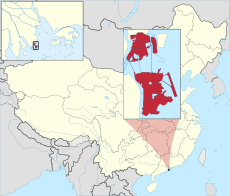| |||||||||||||||||||||||||||||||||||||||||||||||||||||||||||||||||||||||||||||||||||||||||||||||||
Macau is one of the two Special Administrative Regions of the People's Republic of China. Macau lies on the western side of the Pearl River Delta across from Hong Kong to the east, which is about 64 kilometers, also bordered by Guangdong Province to the north and facing the South China Sea to the east and south. With an estimated population of around 624,000 living in an area of 31.3 km2 (12.1 sq mi), it is the most densely populated region in the world.
A former Portuguese colony, Macau was administered by Portugal from the mid-16th century until late 1999, when it was the last remaining European Colony in Asia. Portuguese traders first settled in Macau in the 1550s. In 1557, Macau was rented to Portugal by the Ming Dynasty as a trading port. The Portuguese administered the city under Chinese authority and sovereignty until 1887, when Macau became a colony of the Portuguese empire. Sovereignty over Macau was transferred back to China on 20 December 1999. The Sino-Portuguese Joint Declaration and the Basic Law of Macau stipulate that Macau operate with a high degree of autonomy until at least 2049, fifty years after the transfer.
Under the policy of "one country, two systems", the PRC's Central People's Government is responsible for the territory's defense and foreign affairs, while Macau maintains its own legal system, police force, monetary system, customs policy, and immigration policy. Macau participates in many international organizations and events that do not require members to possess national sovereignty.
Macau became the world's largest gambling centre in 2006, with the economy heavily dependent on gambling and tourism, as well as manufacturing. Cantonese people from Hong Kong and Guangdong, in addition recent mainland tourism from Mandarin-speaking regions, have boosted the economy of Macau significantly. According to The World Fact book, Macau has the second highest life expectancy in the world. Moreover, it is one of only a few regions in Asia with a "very high Human Development Index", ranking 25th as of 2011.
Best Time to Travel Macau:
The best time to visit Macau is from October to March, since the weather other than these month are hot and foggy.
Macau is geographically divided into four regions:
Macau Peninsula- The northernmost region connected to the Chinese mainland. It is the center of most tourist activity and is densely crowded.
Taipa- The island south of the peninsula, accessible via three bridges. It is a major residential center and is the location of Macau's International Airport.Cotai- A strip of reclaimed land between Coloane and Taipa, with vast new casinos rising up.
Coloane-The most southern island, it is considerably less developed than the other regions due to its mountainous terrain.
How to Get in Macau:
Hong Kong is 60-90 minutes by ferry.
Shenzhen is 1 hour by ferry.
Shenzhen is 1 hour by ferry.
By Airplane.
By car- There are two vehicular entry points into Macau from China- the Portas do Cerco and the Lotus Bridge You can only enter if your vehicle (cars only, no motorcycles) has both Macau and mainland China number plates and the driver carries both Macau and China driver's licenses.
Transportation System in Macau:
Bus:
Macau and its districts are served by three bus companies - Transportes Urbanos Macau (Transmac), Sociedade de Transportes Colectivos de Macau (TCM) and since August 2011, Sociedade de Transportes Públicos Reolian (Reolian). The bus system in Macau can be difficult to use. Bus drivers usually only speak Cantonese, very little English or Mandarin and certainly no Portuguese at all. Most bus stops contain no English.
Scooter:
Scooters are a wonderful way to see the sites of Macau, they are also the primary mode of transport for locals due to Macau's narrow streets and lack of car parking space. Scooters will seat one or two people and can provide the convenience to see some of the more beautiful and less crowded spots in Macau, such as Coloane Village, Cheoc Van Beach or the Portuguese fort.
By Taxi:
By Car:
Car rental is not a much popular option in Macau given the territory's high population density and small size.
By Cycle Rickshaw:
cycle rickshaws are a dying breed, although a few still lurk around tourist haunts like the ferry terminal and Hotel Lisboa. Prices are negotiable, but a few hours of city touring by triciclo might cost around $200.
On Foot:
This is arguably the best way to get around the Macau Peninsula, which is small.
Places to Travel in Macau:
Where to Stay:
Macau is very backpacker unfriendly. Due to government regulations there are no hostels in operation and the one YHA requires special permission for lodging. Therefore if you are a backpacker then it is better to stay in Hong Kong and come to Macau for the day, unless you're willing to spend $190 per night for a bed with no facilities.
The bulk of Macau's hotels are on the Peninsula and Cotai, although there are also many options - including high-end ones - on Taipa.




